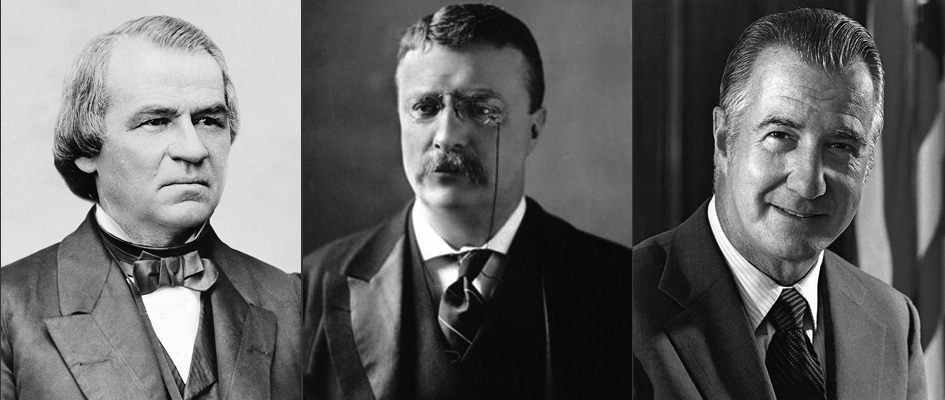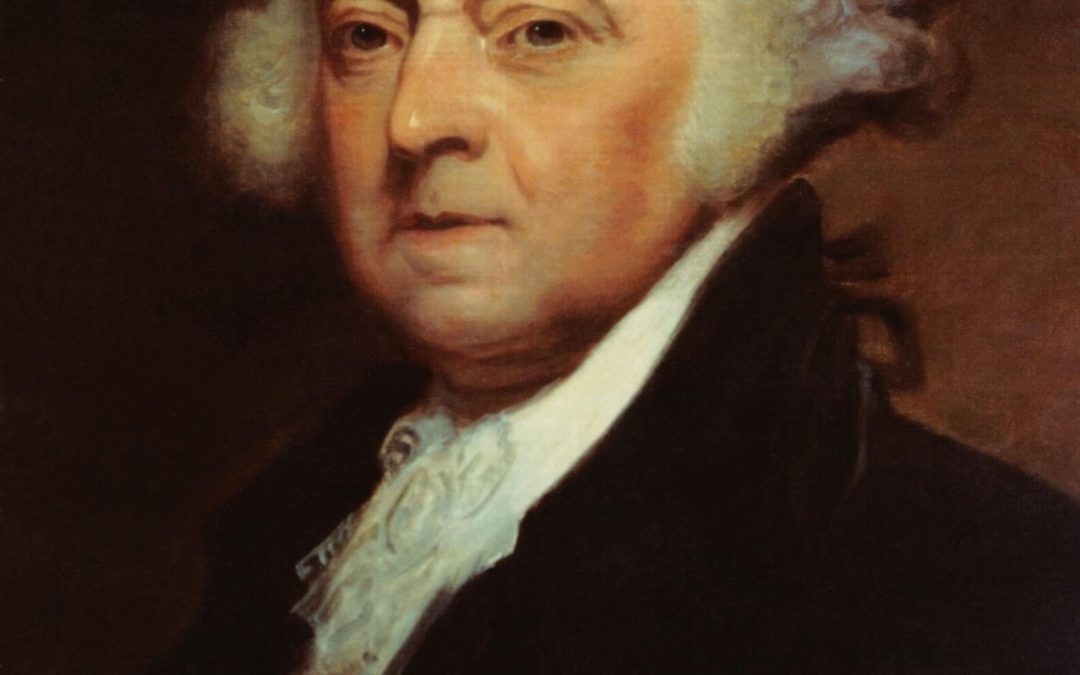“My country,” a frustrated John Adams once wrote about the vice presidency, “has in its wisdom contrived for me the most insignificant office that ever the invention of man contrived or his imagination conceived.” He has not been alone throughout our nation’s history in complaining about the insignificance of the office of vice president.
- Not dead yet: Daniel Webster, the famed Massachusetts Senator refused to run as vice-president under William Henry Harrison, declaring that “I do not propose to be buried until I am really dead.”
- Never heard from again: Some seven decades later, Woodrow Wilson’s vice-president, Thomas Marshall, liked to tell the following tale about the vice-presidency: “Once there were two brothers. One ran away to sea, the other was elected Vice President, and nothing was ever heard of either of them again.
- “Warm spit: Franklin Roosevelt’s colorful vice-president during FDR’s first two terms was not enamored with the office noting that it was “not worth a bucket of warm piss” (sometimes sanitized as “warm spit”).

Andrew Johnson, Theodore Roosevelt, Spiro Agnew
Increased influence of the vice-president: In recent years, since Jimmy Carter gave Vice-President Walter Mondale a larger portfolio, the role of the vice-president has expanded and become more significant. Al Gore’s role under Bill Clinton was significant, Dick Cheney was viewed by many as the power behind the throne under George W. Bush, and Joe Biden has been an active and engaged vice-president.
There are three reasons why the vice presidential nominee and the ultimate winner is important.
Campaigning: One of the considerations that presidential nominees consider in selecting a vice-presidential running mate is how that person will help in winning the election.
- Picking a vice-presidential candidate from a key swing state may help tilt the election scales.
- Sometimes, the person is selected to appeal to a demographic group such as minorities or women.
- Sometimes the decision is made to complement perceived weaknesses of the presidential nominee.
- In 1900, the decision to select New York Governor Theodore Roosevelt to be William McKinley’s running mate was influenced by New York state party bosses who didn’t like Roosevelt’s reform minded actions and wanted him out of the governor’s chair.
Governing Well: But beyond simply winning an election, the vice-presidency matters in actually being an important part of the administration. We live in a complex and dangerous world, and so hopefully the days are gone when the president does not keep the vice-president informed about domestic and international issues.
- Truman in the dark: Upon Franklin D. Roosevelt’s death in 1945, Harry Truman, who had been president for less than three months, was woefully uninformed about critical issues. Truman, however, was a quick study with a good sense of history and rose to the occasion. The Constitution assigns the vice-president just one task and that is to preside over the Senate and to cast a vote in the event of a tie on any legislation in that body.
It is also very important that the president and vice-president enjoy an easy and warm relationship, for the good of the country, that enables them to work effectively together.
- From different political parties: Fortunately, with the passage of the 12th Amendment to the Constitution, we have been able to avoid a repeat of what occurred in 1796 when electors in the Electoral College, who did not then vote separately for president and vice-president, elected John Adams, a Federalist, as president, and Thomas Jefferson, a Democratic-Republican, as his vice-president. Being from two different political parties and with different governing philosophies, created tensions.
Becoming President: But it is the prospect of the vice-president being a heartbeat away from the presidency that makes this sometimes insignificant job, one of critical importance. The vice-president must be able to step into the Oval Office and take command of the reigns of government at a moment’s notice. Of the 43 men who have served as president, nine of them, or 20% of the presidents, assumed office upon the death or resignation of the president (4 assassinations; 4 natural cause deaths; 1 resignation).
- Concerns about VP Theodore Roosevelt: Vice-presidents have not always been universally regarded as competent or appropriate picks for the office, although sometimes they have turned out to do a good job as president. In 1900, William McKinley’s campaign manager, Mark Hanna, was not pleased with the selection of Theodore Roosevelt as vice-president. Hanna told McKinley: “Your duty to the Country is to live for four years from next March.” McKinley was assassinated six months into his term, and “that damn cowboy,” as Hanna referred to Theodore Roosevelt, became president. Roosevelt, of course, did well in the position, and now sits along with Washington, Jefferson, and Lincoln on Mount Rushmore.
Questionable Vice-Presidential Nominees: In election years such as 2016, speculation is rife by pundits and the populace in playing the political parlor game of guessing who the presidential nominees will select for their running mates. Unfortunately, our history is replete with examples vice-presidential picks that have not been qualified for the presidency. Sometimes, the veep is picked for less than the best reasons.
- Spiro Agnew: In 1968, Richard Nixon picked the unknown Maryland Governor Spiro Agnew as his vice-president. In the days before significant vetting occurred on vice-presidential candidates, it would not be known until later that Agnew had accepted bribes as both governor of Maryland and as a county executive before that. Of course, in the heat of Watergate, Agnew was forced to resign, paving the way for Nixon to appoint Gerald Ford as vice-president, the first time that provision of the 25th Amendment to the Constitution was been invoked.
- Thomas Eagleton in 1972: After Democrat George McGovern, known for his very liberal positions, essentially hijacked the presidential nomination from the party establishment, he was faced with picking his nominee for vice-president. He and his aides had only a day to make this critical decision. After approaching numerous possibilities, including Senator Edward Kennedy, and being turned down by all, McGovern made the decision to select Missouri Senator Thomas Eagleton. In a phone conversation that lasted just a little over a minute, McGovern offered Eagleton the job and Eagleton accepted. There was no vetting of Eagleton for the position, a practice that has since developed after what became known as “The Eagleton Affair” unfolded. Shortly after Eagleton’s selection, news bubbled to the surface that Eagleton had suffered from depression and been treated with electric shock therapy. After initially professing that he was “1,000 percent” behind Eagleton, McGovern backtracked after talking with medical professionals, and Eagleton was removed from the ticket some three short weeks after he had been nominated.
- Dan Quayle: In 1988, George H.W. Bush stunned the political world by selecting the 41 year old Indiana Senator, Dan Quayle, who famously made numerous contradictory, confused, and erroneous statements during the campaign and in his term as vice-president. Many believed that Quayle did not have the experience or temperament to be president should something occur to Bush.
- Other VPs or nominees: There have been other questionable vice-presidents or vice-presidential nominees:
- Millard Fillmore assumed the presidency after Zachary Taylor’s death and is generally regarded as an ineffective president.
- Andrew Johnson who was Abraham Lincoln’s second vice-president, was temperamentally unfit for either the vice-presidency or the presidency that he inherited upon Lincoln’s assassination. He arrived drunk at the Capitol for his inauguration as vice-president in 1865.
- Woodrow Wilson slammed Chester Arthur, who assumed the presidency after James Garfield’s assassination, as “a nonentity with side whiskers.”
- Alaska Governor Sarah Palin was plucked from obscurity by John McCain in 2008 to be his running mate. Immediate questions were raised about her experience and temperament for the office.


 Facebook
Facebook
 Twitter
Twitter
 LinkedIn
LinkedIn
 YouTube
YouTube
 Pinterest
Pinterest